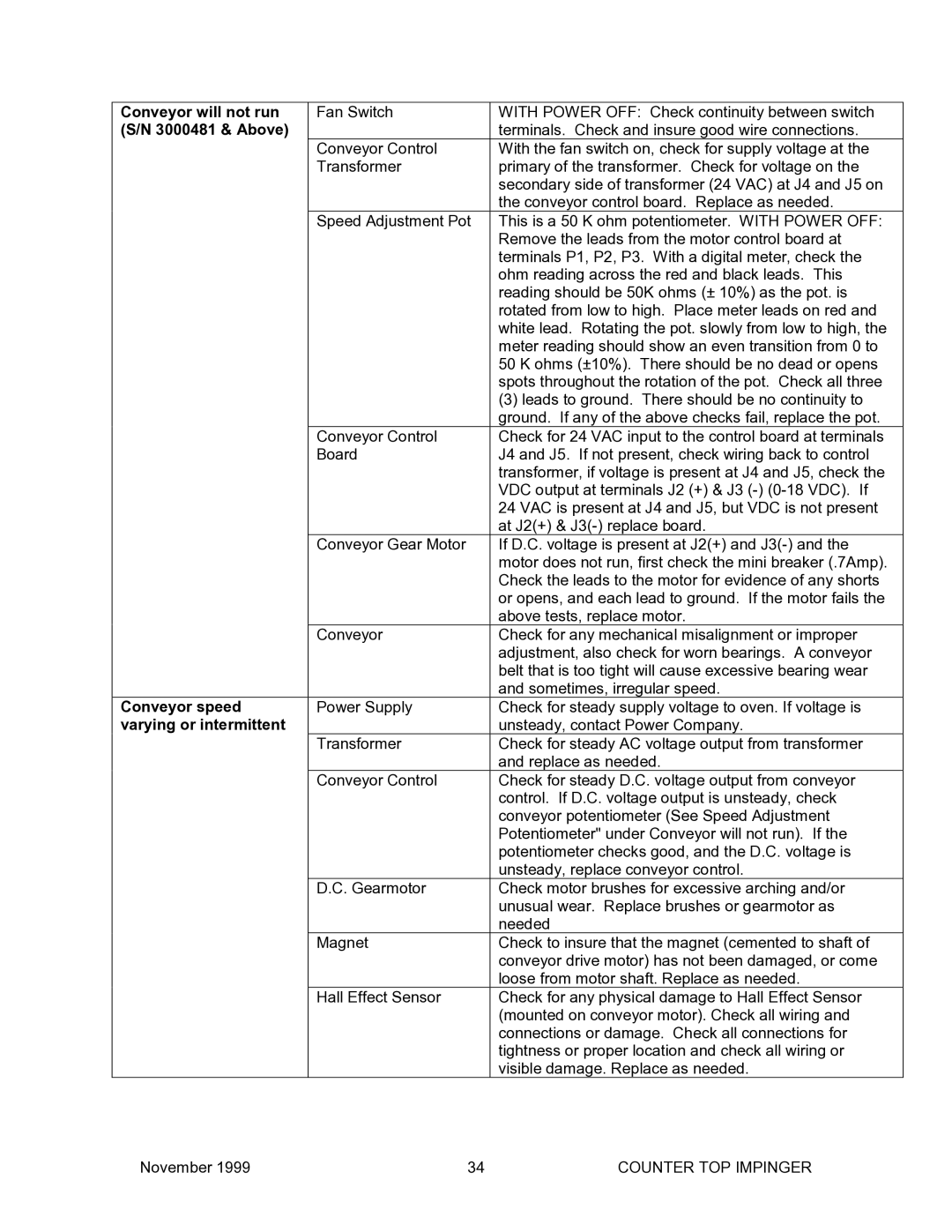Conveyor will not run | Fan Switch | WITH POWER OFF: Check continuity between switch |
(S/N 3000481 & Above) |
| terminals. Check and insure good wire connections. |
| Conveyor Control | With the fan switch on, check for supply voltage at the |
| Transformer | primary of the transformer. Check for voltage on the |
|
| secondary side of transformer (24 VAC) at J4 and J5 on |
|
| the conveyor control board. Replace as needed. |
| Speed Adjustment Pot | This is a 50 K ohm potentiometer. WITH POWER OFF: |
|
| Remove the leads from the motor control board at |
|
| terminals P1, P2, P3. With a digital meter, check the |
|
| ohm reading across the red and black leads. This |
|
| reading should be 50K ohms (± 10%) as the pot. is |
|
| rotated from low to high. Place meter leads on red and |
|
| white lead. Rotating the pot. slowly from low to high, the |
|
| meter reading should show an even transition from 0 to |
|
| 50 K ohms (±10%). There should be no dead or opens |
|
| spots throughout the rotation of the pot. Check all three |
|
| (3) leads to ground. There should be no continuity to |
|
| ground. If any of the above checks fail, replace the pot. |
| Conveyor Control | Check for 24 VAC input to the control board at terminals |
| Board | J4 and J5. If not present, check wiring back to control |
|
| transformer, if voltage is present at J4 and J5, check the |
|
| VDC output at terminals J2 (+) & J3 |
|
| 24 VAC is present at J4 and J5, but VDC is not present |
|
| at J2(+) & |
| Conveyor Gear Motor | If D.C. voltage is present at J2(+) and |
|
| motor does not run, first check the mini breaker (.7Amp). |
|
| Check the leads to the motor for evidence of any shorts |
|
| or opens, and each lead to ground. If the motor fails the |
|
| above tests, replace motor. |
| Conveyor | Check for any mechanical misalignment or improper |
|
| adjustment, also check for worn bearings. A conveyor |
|
| belt that is too tight will cause excessive bearing wear |
|
| and sometimes, irregular speed. |
Conveyor speed | Power Supply | Check for steady supply voltage to oven. If voltage is |
varying or intermittent |
| unsteady, contact Power Company. |
| Transformer | Check for steady AC voltage output from transformer |
|
| and replace as needed. |
| Conveyor Control | Check for steady D.C. voltage output from conveyor |
|
| control. If D.C. voltage output is unsteady, check |
|
| conveyor potentiometer (See Speed Adjustment |
|
| Potentiometer" under Conveyor will not run). If the |
|
| potentiometer checks good, and the D.C. voltage is |
|
| unsteady, replace conveyor control. |
| D.C. Gearmotor | Check motor brushes for excessive arching and/or |
|
| unusual wear. Replace brushes or gearmotor as |
|
| needed |
| Magnet | Check to insure that the magnet (cemented to shaft of |
|
| conveyor drive motor) has not been damaged, or come |
|
| loose from motor shaft. Replace as needed. |
| Hall Effect Sensor | Check for any physical damage to Hall Effect Sensor |
|
| (mounted on conveyor motor). Check all wiring and |
|
| connections or damage. Check all connections for |
|
| tightness or proper location and check all wiring or |
|
| visible damage. Replace as needed. |
November 1999 | 34 | COUNTER TOP IMPINGER |
